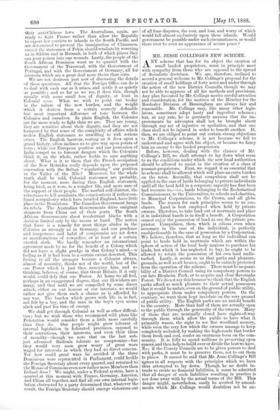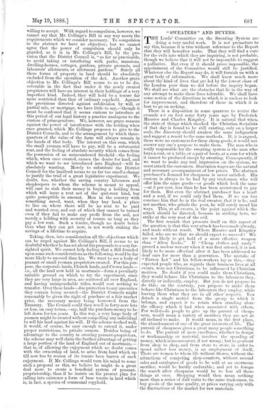MR. JESSE COLLINGS'S NEW SCHEME.
ANY scheme that has for its object the creation of small landed proprietors, must in principle meet with sympathy from those who are opposed to the spread of Socialistic doctrines. We are, therefore, inclined to accord a general welcome to Mr. Collings's proposal for the creation of small holdings of forty acres and under through the action of the new District Councils, though we may not be able to approve of all his methods and provisions. Any plan favoured by Mr. Collings merits careful attention and consideration, for the motives of the Member for the Bordesley Division of Birmingham are always fair and reasonable. Mr. Collings may, like many other legis- lators, sometimes adopt hasty and imperfect schemes ; but, at any rate, he is genuinely anxious that the im- provements he advocates shall not be brought about through any act of injustice or spoliation, and that one class shall not be injured in order to benefit another. If, then, we are obliged to point out certain strong objections to Mr. Collings's scheme, it is not because we fail to understand and agree with his object, or because we fancy him an enemy to the landed proprietors.
Before, however, dealing with the clauses of Mr.
Collings's Bill, we shall attempt to lay down what seem to us the conditions under which the new local authorities should be allowed to assist in the creation of a class of peasant-proprietors. First, we regard it as essential that no scheme shall be allowed which will place an extra burden on the rates. Secondly, that compulsion shall not be applied in the case of lands belonging to private individuals until all the land held in a corporate capacity has first been had recourse to,—i.e., lands belonging to the Ecclesiastical Commissioners, to the Universities, to schools and charities, to Muncipal Corporations, to the Crown, and all glebe lands. The reason for such principles seems to us con- clusive. Land is best employed when held by private owners. Therefore, to take land out of mortmain and place it in individual hands is in itself a benefit. A Corporation cannot enjoy the possession of land as can the private pro- prietor. Compulsion, then, which is odious even when necessary in the case of the individual, is perfectly unobjectionable in the case of possession by a Corporation. We believe, therefore, that as long as the individual can point to lands held in mortmain which are within the sphere of action of the local body anxious to purchase his lands, but which it has neglected to buy, he ought to be allowed to retain the possession of his own land undis- turbed. Lastly, it seems to us that parks and pleasure- grounds, as well as all houses, ought to be entirely protected from the operation of the scheme. There must be no possi- bility of a District Council using its compulsory powers to cut into Blenheim Park, or to acquire and clear Savernake Forest. We do not say this because we think that the English parks afford so much pleasure to their actual possessors that it would be unfair, even on the ground of public utility, to appropriate them under compulsory powers. On the contrary, we want them kept inviolate on the very ground of public utility. The English parks are an untold benefit to the country. More than half of them are actually open to the public through the generosity of the owners. Many of those that are nominally closed have rights-of-way through them which allow the public to have what it primarily wants, the right to see fine woodland scenery, while even the very few which the owners manage to keep completely secluded, by making the high-roads that border them fresh and. cool, confer an enormous boon on the com- munity. It is folly to spend millions in preserving open spaces, and then help to build over or divide the bestwe have. No; if the County Councils are to be given powers to deal with parks, it must be to preserve them, not to cut them to pieces. It cannot be said that Mr. Jesse Collings's Bill agrees in all respects with the principles which we have thus attempted to lay down. Though he no doubt in- tends to create no financial liabilities, it must be admitted that all danger of such liabilities resulting in practice is not done away with by the actual terms of the Bill. This danger might, nevertheless, easily be averted by amend- ments which Mr. Collings would doubtless not be un. willing to accept. With regard to compulsion, however, we cannot say that Mr. Collings's Bill in any way meets the requirements which we consider necessary. To compulsion in the abstract we have no objection ; but we cannot agree that the power of compulsion should only be guarded, as it is in Mr. Collings's Bill, by the pro- vision that the District Council is, "so far as practicable, to avoid taking or interfering with parks, mansions, dwelling-houses, cottages, gardens, private grounds, and labourers' allotments, or allotment gardens." Surely all these forms of property in land should be absolutely excluded from the operation of the Act. Another grave objection to Mr. Collings's Bill seems to us to be dis- coverable in the fact that under it the newly created proprietors will have an interest in their holdings of a very imperfect kind. Indeed, they will hold by a tenure far more restricted than that of ordinary copyhold. Against the provisions directed against subdivision by will, or partial sale, or mortgage, we have little to say,—though it must be confessed that it seems curious to introduce at this period of our legal history a practice analogous to the custom of primogeniture. We, however, see grave reasons against the power of interference with the holding when once granted, which Mr. Collings proposes to give to the District Councils, and to the arrangement by which three- quarters of the value of the farm will always remain in the hands of that body. The interest on this sum, which the small yeoman will have to pay, will be a substantial rent, and the feeling of absolute security which comes from the possession of an unincumbered freehold—the feeling which, when once created, causes the desire for land, and which we want to see introduced into England—will be absolutely wanting. Merely to substitute the District Council for the landlord seems to us far too small a change to justify the trial of a great legislative experiment. We doubt, too, whether the saving country labourers and shopkeepers to whom the scheme is meant to appeal, will care to sink their money in buying a holding from which will issue a rent not of the quit-rent kind, but quite perceptible in amount. Men in the country with something saved, want, when they buy land, a place to live on where there will be no rent to be paid and worried over, and out of which they cannot be turned even if they fail to make any profit from the soil, not merely a holding with security of tenure as long as they pay a low rent. Such a tenure, though no doubt better than what they can get now, is not worth sinking the savings of a lifetime to acquire.
Taking, then, into consideration all the objections which can be urged against Mr. Collings's Bill, it seems to us doubtful whether he has set about his proposals in a very far- sighted spirit. We cannot help feeling that a Bill founded upon some such considerations as the following, would be far more likely to succeed than his. We want to see a body of peasant or small yeoman proprietors created. For this pur- pose, the corporate lands, Church lands, and Crown lands- i.e., all the land now held in mortmain—form a peculiarly suitable ground on which to try the experiment, since they are very large in area, are scattered all over England, and having unimpeachable titles, would cost nothing to transfer. Over these lands—due protection to any amenities they contain being secured—the District Councils might reasonably be given the right of purchase at a fair market price, the necessary money being borrowed from the Treasury. The Council could then resell in forty-acre lots or less, on easy terms,—say, half the purchase-money to be left down for ten years. In this way, a very large body of yeomen might be created without compelling any individual to sell his land against his will. If the scheme worked well, it would, of course, be easy enough to extend it, under proper restrictions, to private owners. Besides being of advantage to the country in creating peasant-proprietors, the scheme may well claim the further advantage of getting a large portion of the land of England out of mortmain,— that is, of allowing the enjoyment which no doubt comes with the ownership of land, to arise from land which up till now has by reason of its tenure been barren of such enjoyment. If Mr. Collings would turn his mind to some such a proposal as this, we believe he might do a great deal more to create a beneficial system of peasant- proprietorship, than if he insists on his present plan for calling into existence a form of base tenure in land which is, in fact, a species of communal copyhold.



































 Previous page
Previous page